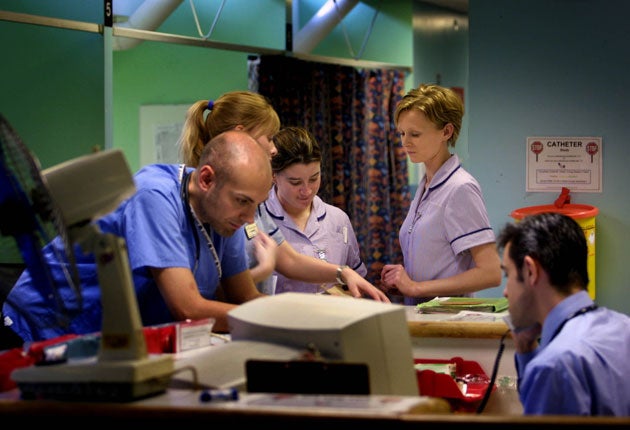NHS 1% pay rises could be scrapped under government proposals
Unions react with anger as the Department of Health says it cannot afford staff 1% pay increases

Your support helps us to tell the story
From reproductive rights to climate change to Big Tech, The Independent is on the ground when the story is developing. Whether it's investigating the financials of Elon Musk's pro-Trump PAC or producing our latest documentary, 'The A Word', which shines a light on the American women fighting for reproductive rights, we know how important it is to parse out the facts from the messaging.
At such a critical moment in US history, we need reporters on the ground. Your donation allows us to keep sending journalists to speak to both sides of the story.
The Independent is trusted by Americans across the entire political spectrum. And unlike many other quality news outlets, we choose not to lock Americans out of our reporting and analysis with paywalls. We believe quality journalism should be available to everyone, paid for by those who can afford it.
Your support makes all the difference.Unions have threatened industrial action after a Government body announced it could not afford to pay the 1 per cent pay rise promised for NHS staff.
Instead of using money set aside for NHS workers, the Department of Health (DoH) is proposing it is spent on the modernisation of pay structures.
The DoH have said the increase, due to be implemented in April 2014, was unaffordable alongside the 3.5 per cent average annual pay rise staff receive under a pay progression system.
Unions have reacted with anger, arguing that a pay freeze would demoralise staff and could threaten the quality of care patients receive.
Rehana Azam, national officer of the GMB, said: “GMB members in the NHS are already totally fed up with this Government's cuts to NHS services and jobs, which staff know is putting patient wellbeing at risk.
“If the Government now wants to attack NHS staff pay while offering tax cuts to married couples it will be the final straw that will lead to calls for industrial action.”
Speaking on BBC's Today programme, Rachael Maskell, of Unite union, said staff "holding the NHS together at this very difficult time" deserved the pay reward.
She said: “It is about choices and the NHS staff have already had two years of a pay freeze - 1 per cent last year - and, quite frankly, are really falling behind inflation now with their wages.”
In a submission to the NHS pay review body, the DoH said the national health service was up against its biggest financial challenge in history.
The health department said the dilemma is “either pay staff more, accepting that this may do little to improve the quality of care for patients and is likely to restrict the number of staff employers can afford to employ, or, to reform contracts to enable employers to use their pay bill, as part of their overall employment offer, to maintain safe staffing levels, with stronger links to performance, quality and productivity”.
In his spending review in June, Chancellor George Osborne said public sector pay rises in 2015/16 “will be limited to an average of up to 1 per cent”.
But he also said the Government would reform “antiquated” systems of automatic pay progression that were seeing some salaries rise by 7per cent “regardless of performance”.
“Progression pay can at best be described as antiquated; at worst, it's deeply unfair to other parts of the public sector who don't get it and to the private sector who have to pay for it,” he told the Commons.
“So we will end automatic progression pay in the civil service by 2015-16. And we are working to remove automatic pay rises simply for time served in our schools, NHS, prisons and police.”
The DoH quoted the Chancellor's words in its submission to the pay review bodies, and said the national medical pay frameworks meant rises worth around £200 million a year.
“This is out of step with our wider policy on public sector pay and the ambitions the Chancellor set out in the spending round.” it said.
“The 1 per cent that the Government has made available for pay in the spending round would, in our view, be best deployed in supporting the modernisation of national pay frameworks."
Additional reporting by PA
Join our commenting forum
Join thought-provoking conversations, follow other Independent readers and see their replies
Comments